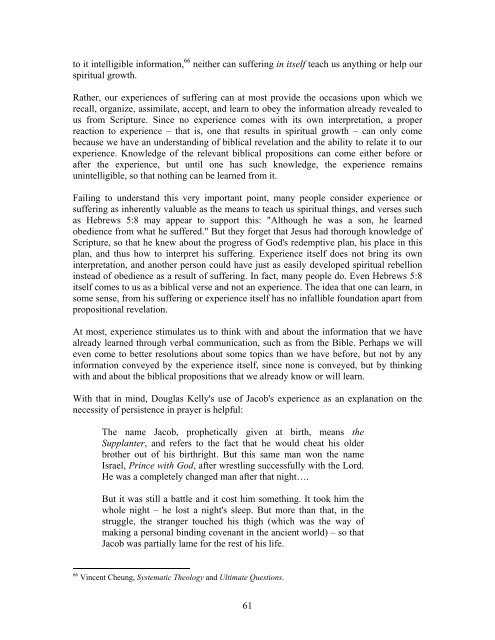Prayer and Revelation - Online Christian Library
Prayer and Revelation - Online Christian Library
Prayer and Revelation - Online Christian Library
Create successful ePaper yourself
Turn your PDF publications into a flip-book with our unique Google optimized e-Paper software.
to it intelligible information, 66 neither can suffering in itself teach us anything or help ourspiritual growth.Rather, our experiences of suffering can at most provide the occasions upon which werecall, organize, assimilate, accept, <strong>and</strong> learn to obey the information already revealed tous from Scripture. Since no experience comes with its own interpretation, a properreaction to experience – that is, one that results in spiritual growth – can only comebecause we have an underst<strong>and</strong>ing of biblical revelation <strong>and</strong> the ability to relate it to ourexperience. Knowledge of the relevant biblical propositions can come either before orafter the experience, but until one has such knowledge, the experience remainsunintelligible, so that nothing can be learned from it.Failing to underst<strong>and</strong> this very important point, many people consider experience orsuffering as inherently valuable as the means to teach us spiritual things, <strong>and</strong> verses suchas Hebrews 5:8 may appear to support this: "Although he was a son, he learnedobedience from what he suffered." But they forget that Jesus had thorough knowledge ofScripture, so that he knew about the progress of God's redemptive plan, his place in thisplan, <strong>and</strong> thus how to interpret his suffering. Experience itself does not bring its owninterpretation, <strong>and</strong> another person could have just as easily developed spiritual rebellioninstead of obedience as a result of suffering. In fact, many people do. Even Hebrews 5:8itself comes to us as a biblical verse <strong>and</strong> not an experience. The idea that one can learn, insome sense, from his suffering or experience itself has no infallible foundation apart frompropositional revelation.At most, experience stimulates us to think with <strong>and</strong> about the information that we havealready learned through verbal communication, such as from the Bible. Perhaps we willeven come to better resolutions about some topics than we have before, but not by anyinformation conveyed by the experience itself, since none is conveyed, but by thinkingwith <strong>and</strong> about the biblical propositions that we already know or will learn.With that in mind, Douglas Kelly's use of Jacob's experience as an explanation on thenecessity of persistence in prayer is helpful:The name Jacob, prophetically given at birth, means theSupplanter, <strong>and</strong> refers to the fact that he would cheat his olderbrother out of his birthright. But this same man won the nameIsrael, Prince with God, after wrestling successfully with the Lord.He was a completely changed man after that night….But it was still a battle <strong>and</strong> it cost him something. It took him thewhole night – he lost a night's sleep. But more than that, in thestruggle, the stranger touched his thigh (which was the way ofmaking a personal binding covenant in the ancient world) – so thatJacob was partially lame for the rest of his life.66 Vincent Cheung, Systematic Theology <strong>and</strong> Ultimate Questions.61
















